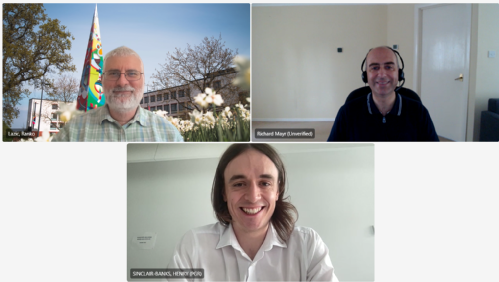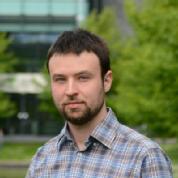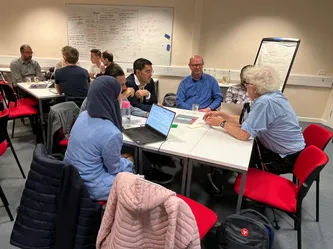Computer Science News
Eight papers accepted to NeurIPS 2024
Eight papers authored by Computer Science researchers from Warwick have been accepted for publication at the 38th Conference on Neural Information Processing Systems, the leading international venue for machine learning research, which will be held on 10-15 December 2024 in Vancouver, British Columbia, Canada:
- Generating Origin-Destination Matrices in Neural Spatial Interaction Models, by Ioannis Zachos, Mark Girolami, and Theodoros Damoulas
- Interventionally Consistent Surrogates for Complex Simulation Models, by Joel Dyer, Nicholas Bishop, Yorgos Felekis, Fabio Massimo Zennaro, Ani Calinescu, Theodoros Damoulas, and Michael Wooldridge
- Learning the Expected Core of Strictly Convex Stochastic Cooperative Games, by Phuong Nam Tran, The Anh Ta, Shuqing Shi, Debmalya Mandal, Yali Du, and Long Tran-Thanh
- Physics-Informed Variational State-Space Gaussian Processes, by Oliver Hamelijnck, Arno Solin, and Theodoros Damoulas
- SARAD: Spatial Association-Aware Anomaly Detection and Diagnosis for Multivariate Time Series, by Zhihao Dai, Ligang He, Shuanghua Yang, and Matthew Leeke
- Symmetric Linear Bandits with Hidden Symmetry, by Phuong Nam Tran, The Anh Ta, Debmalya Mandal, and Long Tran-Thanh
- The Effectiveness of Surprisingly Popular Voting with Partial Preferences, by Hadi Hosseini, Debmalya Mandal, and Amrit Puhan
- What makes unlearning hard and what to do about it, by Kairan Zhao, Meghdad Kurmanji, George-Octavian Bărbulescu, Eleni Triantafillou, and Peter Triantafillou
PhD Studentship in the topic of Multiagent Systems and related areas
We are seeking PhD candidates in the topic of Multiagent Systems and related areas, with particular emphasis on one or more of: computational social choice, algorithmic game theory, multiagent learning, and social and economic networks. The multiagent systems researchers at University of Warwick include Markus Brill, Debmalya Mandal, Ramanujan Sridharan, Long Tran-Thanh, and Paolo Turrini.
The expected starting date is October 2025 or as soon as possible thereafter. The deadline for our internal application round is 1 November 2024. To apply, please fill out the application form (which will ask you to upload a CV and a letter of motivation). We aim to have interviews between November 11th and 22nd, 2024. Top-ranked candidates will be put forward for a fully funded position through the Computer Science Centre for Doctoral Training and Research (CDT) by January 15th 2025.
Henry Sinclair-Banks successfully defends his PhD thesis
Many congratulations to Henry Sinclair-Banks for passing his PhD viva today, which was one of the shortest and best in the long memories of the examiners, Dr Richard Mayr from the University of Edinburgh, and our own Professor Ranko Lazic.

Best Paper Award and 6 papers at ICALP 2024
Six papers co-authored by DIMAP and Theory and Foundations researchers were presented earlier in July at ICALP 2024, the 51st International Colloquium on Automata, Languages, and Programming:
- Rohan Acharya, Marcin Jurdzinski, Aditya Prakash: Lookahead Games and Efficient Determinisation of History-Deterministic Büchi Automata,
- Dmitry Chistikov, Alessio Mansutti, Mikhail R. Starchak: Integer Linear-Exponential Programming in NP by Quantifier Elimination,
- Artur Czumaj, Guichen Gao, Shaofeng H.-C. Jiang, Robert Krauthgamer, Pavel Veselý: Fully-Scalable MPC Algorithms for Clustering in High Dimension,
- Argyrios Deligkas, Eduard Eiben, Robert Ganian, Iyad Kanj, M. S. Ramanujan: Parameterized Algorithms for Coordinated Motion Planning: Minimizing Energy,
- Julian Dörfler, Christian Ikenmeyer: Functional Closure Properties of Finite ℕ-Weighted Automata,
- Zhenjian Lu, Rahul Santhanam: Impagliazzo's Worlds Through the Lens of Conditional Kolmogorov Complexity.
ICALP is the main conference and annual meeting of the European Association for Theoretical Computer Science (EATCS). This year's ICALP took place in Tallinn, Estonia, on the 8th to 12th of July 2024. Dmitry's paper "Integer Linear-Exponential Programming in NP by Quantifier Elimination" won the Best Paper Award of ICALP's Track B, which is a flagship research meeting on Automata, Logic, Semantics, and Theory of Programming. The paper studies the following problem: given a system of linear equations and constraints of the form y=2x, does it have a solution over the natural numbers? By using and extending a method that generalises Gaussian elimination, Dmitry and his co-authors Alessio Mansutti and Mikhail Starchak show that the problem belongs to the complexity class NP. This result provides a way to efficiently certify the existence of a solution, even if all solutions are very big (towers of exponentials).
Dmitry's paper "Integer Linear-Exponential Programming in NP by Quantifier Elimination" won the Best Paper Award of ICALP's Track B, which is a flagship research meeting on Automata, Logic, Semantics, and Theory of Programming. The paper studies the following problem: given a system of linear equations and constraints of the form y=2x, does it have a solution over the natural numbers? By using and extending a method that generalises Gaussian elimination, Dmitry and his co-authors Alessio Mansutti and Mikhail Starchak show that the problem belongs to the complexity class NP. This result provides a way to efficiently certify the existence of a solution, even if all solutions are very big (towers of exponentials).
This is the second time in a row that this award goes to a Warwick paper: Henry Sinclair-Banks, a DIMAP PhD student, was an awardee in 2023.
Upcoming TIA Centre Seminar Series: An Opportunity to Engage with Leading Researchers in Computational Pathology
The Tissue Image Analytics (TIA) Centre at the University of Warwick is excited to announce the continuation of its esteemed seminar series for the 2024/25 academic year. These seminars are a prime opportunity for researchers, students, and professionals to delve into cutting-edge developments in computational pathology and related fields. Held on the 1st and 3rd Mondays of each month from 2 pm to 3 pm, these sessions are a hub for innovative ideas and collaborative discussions. Over the last three years, we have organised 55 seminars, hosting researchers from 42 different institutions from 13 countries and 7 US states, spanning Europe, North America, Australia and Asia.
Highlights from Last Year’s Seminar Series
The past year featured a diverse line-up of distinguished speakers who shared their ground-breaking work. Notable highlights include:
- Dr. Zhui Huang and Dr. Gabrielle Campanella delivered insightful talks on foundation models, exploring their applications and potential in computational pathology. Prof. Hamid Tizhoosh further discussed foundation models and information retrieval. Georg Wölflein offered a comprehensive comparison on many of these models.
- Prof. Inti Zlobec and Daan Geijs visited in person, discussing their pioneering work on studying tumour budding and skin cancer assessment, respectively, providing attendees with the unique opportunity to engage directly.
- Dr. Andrew Song introduced AI-driven methods for efficient patient prognosis using 3D pathology samples, whilst Prof Stefan Feuerriegal and Valentyn MeIynchuk discussed causal machine learning.
- Many, many more fantastic speakers!
Upcoming Seminar Series
We are excited to announce that the upcoming semester promises another stellar roster of speakers. We will kick off the series with a talk by Dr. Ming Y. Lu from Harvard Medical School on the new “PathChat” model (paper: "A Multimodal Generative AI Copilot for Human Pathology") on Monday 14th October. We will also be visited in person by Dr. Danielle Belgrave from GSK and Jack Breen from the University of Leeds, who will offer insights into their pioneering work, to name a few!
How to Participate
These seminars offer a platform to learn from and interact with some of the leading minds in the field. If you are interested in attending or wish to present your research at a future seminar, please contact Dr. Adam Shephard at adam.shephard@warwick.ac.uk.
Stay updated on seminar details by visiting our website and watch past presentations on our YouTube channelLink opens in a new window. We continuously update our webpage with new information about upcoming seminars, so be sure to check back regularly.
Workshop on Future Interface of Computing and Path
Wednesday 3rd July 2024 saw 30+ colleagues interested in Artificial Intelligence and Pathology descend on Warwick University’s TIA Centre to hold a workshop.

Delegates from a variety of disciplines, including pathologists and data scientists, attended the workshop, on Campus. The focus of the workshop was to explore the Future Interface of Computing and Pathology.
The meeting was lively and interactive and will be the first in a series of workshops that will be hosted by the TIA Centre in furtherance of this subject area. Thank you to all those who participated.
If you would like to join in future workshops please contact the TIA Centre at tia@warwick.ac.uk.
6 papers accepted to FOCS 2024
Six papers from the Theory and Foundations Research Group and the Centre for Discrete Mathematics and Its Applications (DIMAP) have been accepted to the 65th IEEE Symposium on Foundations of Computer Science (FOCS 2024), the flagship conference in theoretical computer science that will be held on October 27 - 30, 2024 in Chicago, USA:
- "Reverse Mathematics of Complexity Lower Bounds" by Lijie Chen, Jiatu Li and Igor C. Oliveira.
- "Faster (Δ+1)-Edge Coloring: Breaking the m n1/2 Time Barrier" by Sayan Bhattacharya, Din Carmon, Martin Costa, Shay Solomon and Tianyi Zhang.
- "Fully Dynamic k-Clustering with Fast Update Time and Small Recourse" by Sayan Bhattacharya, Martin Costa, Naveen Garg, Silvio Lattanzi and Nikos Parotsidis.
- "The Tractability Border of Reachability in Simple Vector Addition Systems with States" by Dmitry Chistikov, Wojciech Czerwiński, Łukasz Orlikowski, Filip Mazowiecki, Henry Sinclair-Banks and Karol Węgrzycki.
- "Optimal Coding Theorems for Randomized Kolmogorov Complexity and Its Applications" by Shuichi Hirahara, Zhenjian Lu and Mikito Nanashima.
- "On the Complexity of Avoiding Heavy Elements" by Zhenjian Lu, Igor C. Oliveira, Hanlin Ren and Rahul Santhanam.
